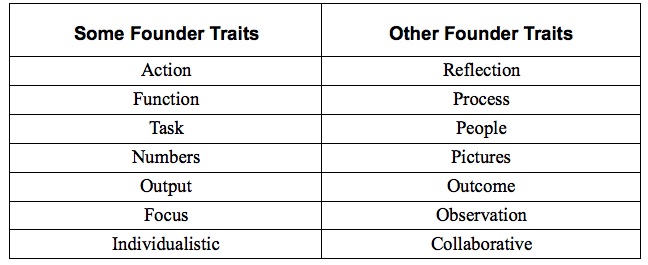Founder Team Balance Avoid Gender Stereotypes
Founder Team Balance: I am a male entrepreneur, who values female founders. I had a female co-founder of my main business back in 1982 and my learning from her was probably greater than anything I learned from most of my male advisers, or colleagues—and she was not trying to teach me anything.
The three main behaviors from which I learned, and from which the venture benefitted, were her:
-
insistence on process, as much as function;
-
concern with outcome, as well as output;
-
focus on the big picture, while not forgetting the numbers.
New ventures are best balanced by the characteristics of both kinds of personality trait, that are actually not exclusive to either gender. Success is dependent on having a founder team balance—one that has a good balance of traits and consequent behaviors.
The table below suggests some highly generalized differences between two sets of traits that need representation in a founding team. The traits in the left column traits are traditionally associated with the masculine and those in the right column are usually associated with the feminine.
Founder Traits

Bear in mind that these characteristics are neither exclusively male, nor exclusively female. There are people of either sex who manifest traits of the opposite gender, and neither gender manifests characteristics exclusively from one column or the other. You might want to stop and think about the gender traits are represented and the extent to which your startup exhibits founder team balance, whatever the founding gender make up actually is.
Founder Team Balance Should Avoid Gender Clichés
I counsel avoiding the cliché stereotypes of gender traits. While entrepreneurship is masculine-stereotyped, many of the traits considered important to entrepreneurial success are traditionally feminine-stereotyped, many of which characterize good entrepreneurship. However, my experience tells me that founder teams that have good founder team balance and include both genders, tend towards better chances of success in the longer term. This is especially true for ventures that aim to change the world for the better.
Much discussion is about the imbalance between the numbers and success of the gender of founders, but I don’t believe it should be about the inequities faced by female founders. And, even if female founders fall into entrepreneurship as a consequence of drivers other than a pressing desire to get into business, their behaviors can be every bit as effective as male founders driven primarily by the urge to start a business. You may appreciate this more if you take a look at Self-Aware Startup Teams. Indeed, research by First Round Capital shows that high-performing investments tend to have at least one female founder, though they did not look at the presence of feminine traits among all-male startups.






